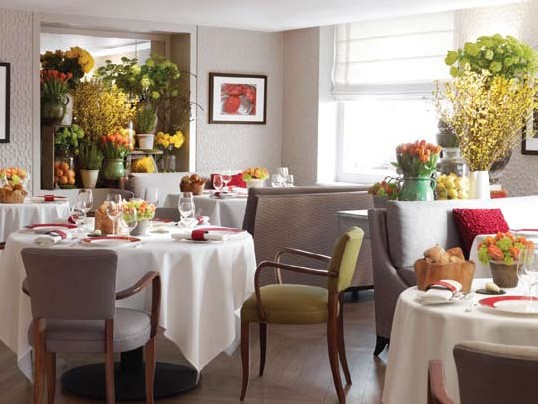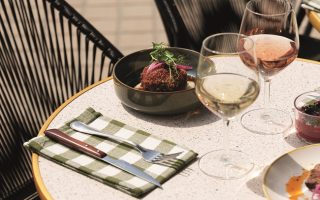France Abroad – The Taste of Gascony

When Eleanor of Aquitaine married soon-to-beking Henry II of England in 1152, she brought to England a goodly chunk of France, including the southwest region still popularly known as Gascony. But in London today you could be forgiven for thinking the reverse has happened. It’s estimated that more French people now live in the British capital than in Strasbourg or Bordeaux, making London effectively France’s sixth-largest city and helping to explain why, during the last presidential elections, candidates for the Elysée Palace have thought it necessary to campaign for votes in the shadow of Big Ben.
So it’s not surprising that one of France’s greatest culinary talents, Pierre Koffmann, should have made London his home, following in the footsteps of fabled French celebrity chefs Marie-Antoine Carême and Georges-Auguste Escoffier. Carême, who cooked for Czar Alexander I and Napoleon before showing up in Britain to help sate George IV’s enormous appetite, left after three years, unable to get along with British weather or his royal patron. A century later Escoffier, who was successively chef at London’s Savoy, the Carlton and Ritz hotels, stuck it out a lot longer, but even he eventually threw in the toque and retired to the sunshine of Monte Carlo.
Fortunately for London, Koffmann, now 64, has outstayed them both and after 42 years in blustery Britain shows no desire to return to his native Gascony—except through what’s cooking. He can now be found at his brasserie-style restaurant, Koffmann’s, in the Berkeley Hotel in Knightsbridge, creating some of the most enticing French regional cuisine to be found outside the hexagone.
Naughty boy
It’s an outcome few would have expected, least of all the faculty at the culinary academy in Koffmann’s hometown of Tarbes, where they predicted their pupil had no future in his chosen profession. “I suppose I was a bit of a bad boy,” he recalls, conceding that his motives for becoming a chef were somewhat suspect. “I wasn’t very good at school and my teachers thought I should leave and learn a trade. Learning to cook was a way of staying in school instead of becoming a postman or a train driver.” Koffmann stuck to his stove and something clearly clicked. Following a circuitous trail of restaurant jobs in Alsace, Côte d’Azur and other French regions, he gained not only a solid grounding in classic French haute cuisine but also exposure to the delights of French country cooking, the peasant cuisine du terroir that is the backbone of all Gallic gastronomy.
Koffmann was already well acquainted with his own terroir, thanks to vacations with his maternal grandparents, Camille and Marcel Cadeillan, at their farmhouse near the tiny village of Saint Puy in Gascony. “My grandmother’s cooking was an important element in my boyhood memories, and was important to me later,” writes Koffmann in his best-selling Memories of Gascony, recently reprinted by publishers Mitchell Beazley. “Like many other Frenchmen, I have retained all my life the taste of the food I ate as a child.”
Koffmann’s move to London in 1970 had more to do with his love of sport than a desire to expand his culinary horizons. After seeing France play England in a rugby match in Twickenham (it was a draw) in 1971, he decided to stay, working first at the Roux brothers’ famous London restaurant Le Gavroche, and then in 1972 as head chef at their newly launched Waterside Inn on the banks of the Thames in Bray. There he met and married Waterside’s manager, Annie, and in 1977 they moved back to London to set up their own restaurant, La Tante Claire, in Chelsea.
With Koffmann’s combined mastery of haute cuisine and cuisine du terroir, La Tante Claire introduced a whole new dimension to London’s gastronomic scene. Some might argue that, back then, this was scarcely a difficult achievement, but in any case Koffmann’s first Michelin star came the year after Tante Claire opened, and his second two years later. The coveted third star took a little longer—it was awarded in 1992—but by then Koffmann was an established star. Along the way he has helped to train or influence a generation of chefs, many of them British, who have earned a total of 20 Michelin stars.
In 1998 La Tante Claire moved to The Berkeley Hotel. And then, in 2003, Koffmann shocked the food world by deciding to close La Tante Claire and retire. He needed a breather, he says. He had not stopped since arriving in London more than 30 years earlier and it was time to recharge the batteries. He wanted to travel, go fishing and collect mushrooms without the incessant demands of a high-flying culinary establishment.
Pigs and pop-ups
But retirement was not destined to last. “There’s only so much golf you can play or fish you can catch or traveling you can do,” Koffmann recalls. “I got bored—and lazy. I thought ‘I’m too young for this’.” He started doing some consulting and agreed to a short stint as head chef at The Bleeding Heart, a venerable watering hole in London’s financial district. But it was the 2009 invitation to run a pop-up restaurant on the roof of the legendary Oxford Street department store Selfridges that pulled Koffmann back into the business. “It was hell at first,” he recalls with a laugh. “It was supposed to be for ten days but lasted two months. We ended up cooking twelve hours a day, seven days a week, and we served thousands of pieds de cochon” (his Tante Claire trademark pig’s feet).
To the relief of Britain’s pig population, no doubt, the pop-up eventually popped down. But by then Koffmann’s creative juices were flowing again and he was back into the demanding rhythms of a restaurant. Above all he recognized that he was happiest in the kitchen. “I thought to myself, I still enjoy it. Why not open a new restaurant?”
And so he did. But not a new Tante Claire. Koffmann’s return is to his roots in Gascony—a refined expression of the food served by his mother and his grandmother. “It’s part of my blood,” he says. No longer concerned with Michelin stars, Koffmann wants to enjoy his return to the kitchen. “I like to cook the kind of food I like to eat,” he insists, and that includes the hearty dishes on his menu—Daube de Joue de Boeuf Grand- Mère (braised beef cheeks in red wine) and Boudin Gascon Croque-Monsieur à l’OEuf (Gascony-style black pudding, grilled ham and cheese with egg), along with three signature dishes from Tante Claire—pied de cochon stuffed with sweetbreads and morels; diver-harvested scallops with squid ink sauce and broccoli purée; and pistachio soufflé with pistachio ice cream.
It’s now almost three years since Koffmann came back. Sitting in his eponymous brasserie on a recent Monday morning, he is in a contemplative mood, and more at ease than his reputation would have you believe. All around him the daily buzz is beginning, as the staff readies the lunch service, but Koffmann takes time to reflect on what’s happening in the world of food. He is no longer as worried as he was a few years ago by the gastronomic scene in France, he says. “Not so long ago it was difficult to get a decent basic meal in many French towns and cities. Spain was much better,” he recalls. “We were forgetting how to cook.” For a time, he says, there was a sameness about the food in restaurants throughout France, a homogeneity he blames partly on the nouvelle cuisine wave of the 1970s that washed away regional distinctions as chefs clambered onto the bandwagon. Now he sees a new generation of enthusiastic, dedicated young chefs breathing fresh life into French cuisine and rediscovering traditional regional cooking with its respect for seasonal variety.
Could he join them back in France one day? The question hangs in the air like a cloud of steam from one of the large cooking vessels in the kitchen that will surely receive an impressive number of pigs’ trotters as the day progresses. Koffmann shakes his head. French chefs who have made it over here, he says, find it very difficult to go back. Does that mean that Koffmann has become a lotophage, an eater of the lotus fruit who, as Greek mythology tells us, is destined to forget his homeland? It’s unlikely, when every day now he has Gascony bubbling on his stove, and no lotus in sight.
Originally published in the March 2013 issue of France Today.
Share to: Facebook Twitter LinkedIn Email
Leave a reply
Your email address will not be published. Required fields are marked *



